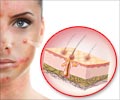Mycopathologia 2020 Feb 01
Fonsecaea pedrosoi Conidia Induces Activation of Dendritic Cells and Increases CD11c+ Cells in Regional Lymph Nodes During Experimental Chromoblastomycosis.
Kimura TFE, Romera LMD, de Almeida SR
The chromoblastomycosis is a subcutaneous mycosis with a high morbidity rate, Fonsecaea pedrosoi being the largest etiologic agent of this mycosis, us ...
Read More
Source: PubMed
J. Dermatol. 2020 Jan 21
Successful treatment of chromoblastomycosis caused by Fonsecaea pedrosoi using imiquimod.
Belda W, Criado PR, Passero LFD
Chromoblastomycosis (CBM) is a fungal infection caused by fungi belonging to the order Chaetothyriales, and caused mainly by Fonsecaea pedrosoi. The c ...
Read More
Source: PubMed
J. Microbiol. Methods
An optimized Agrobacterium tumefaciens-mediated transformation system for random insertional mutagenesis in Fonsecaea monophora.
Xiao X, Li Y, Qin J, He Y, Cai W, Chen Z, Xi L, Zhang J
Chromoblastomycosis (CBM) is a chronic cutaneous or subcutaneous mycosis that is prevalent worldwide. Though CBM tends not to be fatal, it is difficul ...
Read More
Source: PubMed
Indian Dermatol Online J
Dermoscopy of Chromoblastomycosis.
Chauhan P, Jindal R, Shirazi N
Read More
Source: PubMed











